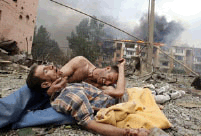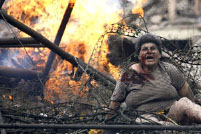Georgia vs South-Ossetia and Russian media
6th September, 2008 by Luke Rajczuk
The outbreak of the war started on the 7th of August, 2008 and lasted nearly a week. Many papers and TV stations in Russia had different viewpoints, not all of which were pro-Russian.
The most ‘significant’ and popular media in Russia are: Russia Today, English language-news channel, the Russian news service RIA Novosti, and the daily newspaper Izvestia. All those published a large number of articles describing the conflict, the series of events, the background and different reasons or, as one might say, pretexts.
The controversy of the war in South Ossetia poses the question of what the actual reason for the attack might have been. Was it Russia’s way of showing the world what may happen if you upset them or was it perhaps just the prospect of a larger regional war that could drag in Russia – and involve the United States as well?
Up to this point Georgia had been locked in confrontational skirmishes over the separatist South Ossetian enclave of Abkhazia, and eventually launched an offensive to reclaim this other breakaway territory. Reports from Russia indicated that Georgian forces were laying siege to Tskhinvali, the South Ossetian capital. And Russia, which backed the separatists, was sending in the tanks.
The Russian media have done a fair job of demonizing Georgian President Mikheil Saakashvili and raising the general level of hysteria (the word fascism was thrown around a lot). Clearly, a Georgia that aspires to NATO membership – and that does not bend to Moscow’s will – irritated the Kremlin enough to spur them into action.
In another publication by Russia Today it was also reported that ‘a large number of Ossetia’s citizens hold Russian passports therefore they must protect their citizens by all means’. Would this be a justifiable excuse for an incursion?
David Bakradze, chairman of the Georgian parliament explained in Russia Today that “we should understand that Russian channels are not just channels of an unfriendly state which are engaged in disinformation, but they are TV channels of the state which declared war and is bombing our territories”.
When fighting in South Ossetia was still continuing, people in Georgia weren’t being shown all the pieces of the puzzle. All Russian TV channels had been taken off the air across the country and some Internet sites had been blocked. Russian journalists were harassed and their materials seized.
At this point the coverage in the Russian media did not abate …
One of Novosti’s articles confirmed that ‘Kiev delivered arms to Tbilisi prior to the conflict’. Russian Prime Minister Vladimir Putin said on October 2 that he considered these alleged arms supplies “a crime.”
Nor was the United States a detached observer in this conflict. The American military has been training and equipping Georgian troops for years, beginning with the Georgian ‘Train and Equip Program’ in 2002.
Isvestya also cited a Russian Defense Ministry Report that had been published three month earlier which claimed that over the past four years Turkey has supplied Georgia with $45 million in weapons and ammunition, as well as training Georgian army officers. Interfax Agency also reported that a Turkish naval ship has entered in to Georgian territorial waters off the coast near the city of Batumi.
 As a response to the reports from Tim Whewell, the BBC reporter who was the first journalist from the ‘western block’ allowed into to the conflict zone, the South Ossetian president Eduard Kokoity told Novosti that “more people in the West have begun to learn the truth about the genocide in South Ossetia and Georgia’s aggression”.
As a response to the reports from Tim Whewell, the BBC reporter who was the first journalist from the ‘western block’ allowed into to the conflict zone, the South Ossetian president Eduard Kokoity told Novosti that “more people in the West have begun to learn the truth about the genocide in South Ossetia and Georgia’s aggression”.
‘For the first time ever, Georgian President Mikhail Saakashvili has admitted that his

country started the military conflict in South Ossetia in August. But the Georgian leader is adamant the action was justified. He was testifying before a parliamentary commission investigating the five-day war.’ This was published in Russia Today on November 28th. RT also quoted Mr Saakashvili’s words in which he admitted that the main and the only reason for the invasion was that ‘South Ossetians killed many Goergian citizens’.
